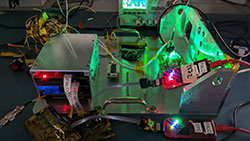University of Colorado, Boulder Professor, Students Continue Work On Cubesat Amid COVID-19 Pandemic Written 8 May 2020

Students at the University of Colorado in Boulder put together this "flatsat" simulator of their MAXWELL cubesat, which they connect to remotely to test software from home. | Credit: University of Colorado Boulder; Aerospace America
Aerospace America reported that in Amanda’s Miller’s telephone interview with University of Colorado, Boulder aerospace and engineering sciences Professor Scott Palo – who chairs AIAA’s Small Satellite Technical Committee – the two discussed his work with University of Colorado graduate students on the development of the MAXWELL cubesat. In his basement, Palo “has hooked up a battery power supply, soldering tools and an oscilloscope – all liberated from his lab” before the COVID-19 pandemic forced him and his students to leave campus. The “idea was to ‘have the tools of the testing’ ready to continue trying out cubesat components and software either at home or by connecting to the lab remotely, he says.” Anticipating the campus closure, “a student team worked in the lab for three days to set up a flatsat, or simulated, version of their upcoming U.S. Air Force-funded MAXWELL cubesat, short for Multiple Access X-band Wave Experiment Located in LEO. From their homes, Palo and his students access, via the internet, this networked array of electronics that are just like the ones planned for MAXWELL, which is now in the testing phase.” This way, “they can continue to upload software for testing.” MAXWELL is “one of 18 small satellites selected by NASA to be deployed as secondary rocket payloads from 2021 to 2023.” MAXWELL “will demonstrate a radio design for smallsats.”
Full Story (Aerospace America)
